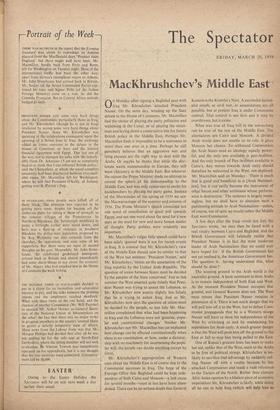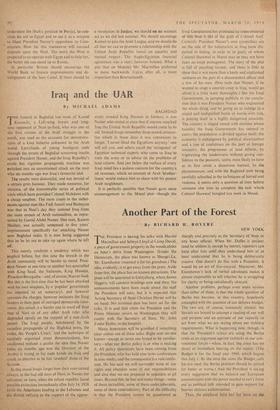MacKhrushchev's Middle East
ON Monday after signing a Baghdad pact with Iraq Mr. Khrushchev attacked President Nasser. On the same day, winding up the Suez debate in the House of Commons, Mr. Macmillan had the choice of playing the party politician and wallowing in the Canal, or of playing the states- man and laying down a constructive line for future British policy in the Middle East. Perhaps Mr. Macmillan finds it impossible to be a statesman in' more than one area at a time. Perhaps he still genuinely believes that an aggressive war and lying excuses are the right way to deal with the Arabs. Or maybe he thinks that while the elec- torate wants statesmanship in Europe, they still want chicanery in the Middle East. But whatever the reason the Prime Minister made no attempt to extend the sphere of his statesmanship to the Middle East, and was only concerned to excite his backbenchers by playing the party game. Instead of the Macwonder of the spring of 1959 we saw the Macwarmonger of the summer and autumn of 1956. The Prime Minister's speech contained not one word of conciliation or good will towards Egypt, and not one word about the need for a new start or the need for new and more honest modes of thought. Party politics were evidently too important.
Mr. Macmillan's vulgar little speech could have been safely ignored were it not for recent events in Iraq. It is ironical that Mr. Khrushchev's view of the Middle East should now be similar to that of the West last summer. 'President Nasser,' said Mr. Khrushchev, 'insists on the annexation of the Iraq republic by the United Arab Republic. The question of union between States must be decided by the peoples of the State concerned.; Just as last summer the West asserted quite falsely that Presi- dent Nasser was trying to annex the Lebanon, so Mr. Khrushchev now asserts slightly less falsely that he is trying to annex Iraq. Just as Mr. Khrushchev now says the question of union must be decided by the people, so last July Mr. Mac- millan complained that what had been happening in Iraq and the Lebanon were not 'genuine, popu- lar and constitutional changes.' Neither Mr. Khrushchev nor Mr. Macmillan has yet explained how change can be effected constitutionally when there is no constitution, or how, under a dictator- ship with no machinery for ascertaining the popu- lar will, the people can decide anything except by force.
Mr. Khrushchev's appropriation of Western cant about the Middle East is of course due to the Communist successes in Iraq. The hope of the Foreign Office that Baghdad could be kept inde- pendent of both Cairo and Moscow—a lost cause for several months—must at last have been aban- doned. There can be no serious doubt that General Kassem is the Kremlin's Nun. A successful nation- alist revolt, or civil war, or assassination are all possible, but at present Iraq is under Communist control. That control is not firm and it may be overthrown, but it exists.
What was true of Iraq will in the not-so-long run be true of the rest of the Middle East. The alternatives are Cairo and Moscow. A divided Arab world does not enable us to rule, it gives Moscow her chance. To withstand Communism the Arab States need an ideology equally power- ful, and the only one available is pan-Arabism. And the only branch of Pan-Arabism available is Cairo's. Any moves towards Arab unity should therefore be welcomed in the West, not deplored. Mr. Macmillan said on Monday : 'There is much that is good and beneficial in it [Arab National- ism], but it can easily become the instrument of other forces and other ambitions whose perform- ance is destruction.' The sentence is largely mean- ingless, but we shall have to abandon 'such a patronising attitude to Arab Nationalism—unless, of course, out of spite we would rather the Middle East went Communist.
A few days after the Iraqi revolt last July the Spectator wrote, 'we may then be faced with a real rivalry between Cairo and Baghdad, and the British Government will belatedly realise that President Nasser is in fact the most moderate leader of Arab Nationalism that we could ever have hoped for.' If the British Government has not yet realised it, the American Government has. The question 'is : having understood this, what should be done?'
The winning ground in the Arab world is the neutralist ground. A basic sentiment in most Arabs is to remain independent of both East and West. At the moment President Nasser occupies that ground, and General Kassem does not. The West must ensure that President Nasser remains in possession of it. There is not much danger that we will pull him off it to the West, but to defeat Com- munist propaganda that he is a Western stooge Nasser will have to show his independence of the West by criticising us and by maintaining his aspirations for Arab unity. A much greater danger is that the West will push him off the ground to the East or fail to stop him being pulled to the East.
One of Russia's greatest feats has been to make her aid, unlike that of the West, seem to the Arabs to be free of political strings. Khrushchev is un- likely to sacrifice that advantage by suddenly cut- ting Nasser off with a rouble because he has attacked Communism and made a rude reference, to the Tartars of the North. Rather than alienate Afro-Asian opinion by a blatant piece of economic imperialism Mr. Khrushchev is likely, while doing all he can to help Iraq (which will help him to undermine the Shah's position in Persia), to con- tinue his aid to Egypt and to use it as a weapon to blunt President Nasser's opposition to Com- munism. How far this manceuvre will succeed depends upon the West. The more the West is prepared to co-operate with Egypt and to help her, the better she can stand up to Russia.
In particular Britain should encourage the World Bank to finance improvements and de- velopments of the Suez ( anal. If there should be a revolution in Jordan, we should on no account act as we did last summer. We should encourage Kuwait to join the Arab League, and we should do all that we can to promote a relationship with the United Arab Republic based on equality and mutual respect. The Anglo-Egyptian financial agreement was a start, however belated. What a pity that on Monday Mr. Macmillan preferred to move backwards. Cairo, after all, is more important than Bournemouth.



































 Previous page
Previous page